Momentum surrounding the Android mobile platform has reached a plateau, with developers now refocusing their efforts on building apps for Apple devices. This somewhat surprising conclusion is just one of many new trends spotted by Appcelerator and analyst firm IDC in their jointly produced developer report based off a survey of over 2,700 active developers worldwide.

According the report, developer interest in Android is waning due to concerns around fragmentation issues and the early, disappointing results from Android tablet sales.
While such a shift in developer mindset could allow for increased attention for other players, namely BlackBerry, Microsoft, Nokia and HP, two-thirds of developers reported they don’t think that any of those companies can reverse the momentum that Apple and Google have today. That said, when it comes to placing an operating system (OS) in the third slot in terms of developer interest, the survey found that Microsoft’s Windows Phone 7 has now unseated RIM’s BlackBerry platform.
Apple Still on Top, Google Plateaus
Interest in Apple iOS development remains high, with 91% of developers reporting interest in iPhone and 86% reporting interest in developing for iPad. iOS fell by one point (iPhone went from 92% to 91%, iPad from 87% to 86%, from January to April 2011), but overall, the platform is strong. 9 out of 10 developers are still building for iPhone.
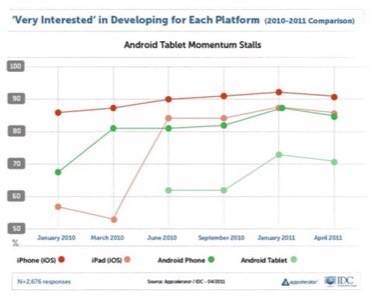
Meanwhile, Android smartphone interest saw a slight, 2-point drop to 85%, but Android tablets fell 3 points to 71% since the prior survey from Q1 2011. The tablet drop in particular appears to represent a discrepancy between the increasing interest in Android as a tablet platform, and the interest in developing for the actual hardware available today.
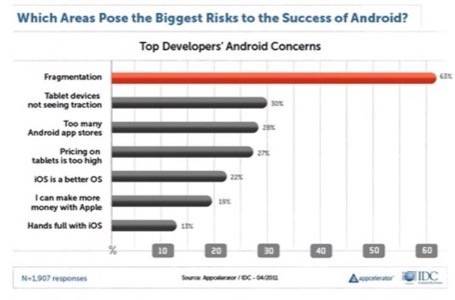
The top problem with Android, according to 63% of respondents, is device fragmentation. Other areas of concern include weak traction in Android tablets (30%) and the existence of multiple Android app stores (28%). However, Android fragmentation is not developers’ main concern in the area of mobile fragmentation. More pressing is the issue with skills fragmentation (Objective-C vs Java, for example), they said, and the fragmentation of OS’s and their capabilities (iOS vs. Android vs. Windows Phone, for example).
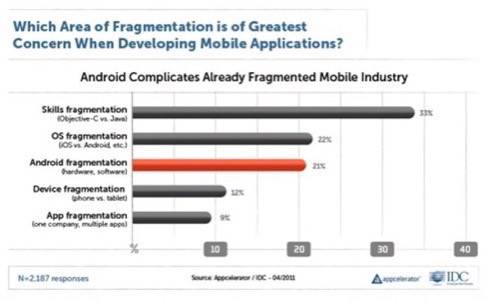
With Android Tablets, Interest Doesn’t Match Reality
There’s a sizeable discrepancy between developers’ reported interest in Android as a tablet OS (71% claim interest here) and the number of developers who are actually in the process of building an app for an Android tablet today. For instance, only 52% are interested in building for one of the leading Android tablets today, the Samsung Galaxy Tab. 44% are interested in building for the Motorola Xoom, 31% in the HTC Flyer, and for the rest of the lot, interest is minimal.
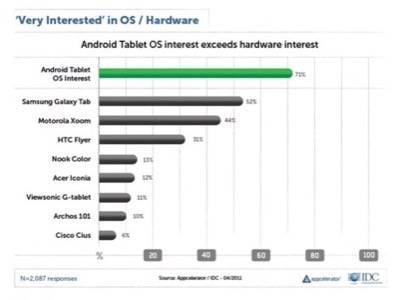
In some cases, explained Scott Schwarzhoff, Appcelerator’s VP of Marketing, the issue is more one of awareness. For instance, Barnes & Noble’s Nook just opened up its own Android app store this week, after this survey was compiled. But with the larger brand names, the issue has more to do with the value of these tablets themselves. Considering the price points set for some of these devices, a consumer may have to ask whether they want an Android tablet or an HDTV, Schwarzhoff noted. In addition, reviews by members of the media have said these new Android tablets feel rushed and aren’t differentiated enough from the iPad to be a worthy alternative for the money being asked.
Some of these issues will resolve themselves in time, Schwarzhoff believes. There’s too much momentum behind Android, he said, for this not to be fixed. In other words, Android’s plateau here may be temporary, as market issues work themselves out.
RIM, Windows Phone 7 Show Declines
On the second tier, when compared with last quarter, interest in developing for RIM and Microsoft platforms dropped substantially. Interest in Microsoft’s Windows Phone fell 7 points to 29%, while interest in BlackBerry fell 11 points to 27%. These changes put Microsoft’s Windows Phone in the third slot in terms of OS interest, with BlackBerry falling further behind.
The problem may not be with the platforms themselves, though, but more of an issue with time, the survey found. 46% of developers said they simply don’t have enough time after dealing with iOS and Android to focus on other platforms. And as noted above, even more (59%) say they think that both Apple and Google are too far ahed for anyone else to catch up.
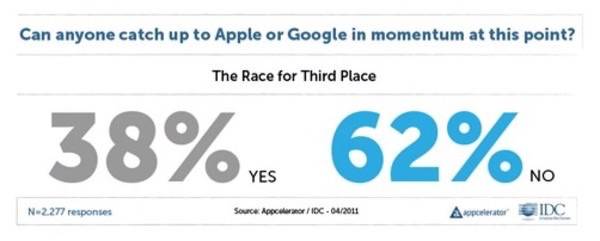
In terms of competing with the mobile giants, 42% developers think that Microsoft’s partnership with Nokia will have more of an impact than RIM’s support for Android apps on its PlayBook and future smartphones (30%).
Cloud Computing Increasingly Important on Mobile
The final part of the survey looked into cloud computing and its impact on mobile. Today, 84% of developers and businesses said they’re building cloud-connected applications. On average, the respondents reported using 13 of the 44 cloud-enabled and cloud-connected services the survey asked about.
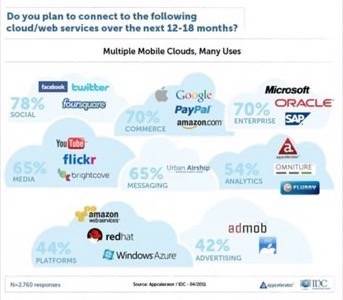
But even here, the issue of fragmentation was present. Some cloud SDKs are not available to all device platforms, for example.
The survey also asked about the always hotly debated “mobile apps vs. mobile Web” question and found the community closely split between developing native apps (48%) or developing “both” native apps and for the Web (42%). Only 10% of die-hards said we should build for the mobile Web only. Also of note, the number one reason developers were interested in mobile Web development was the ease of cross-platform development.
Developers interested in the full report can read it now here.
Note on Survey methodology: This quarter’s report had the biggest sample size to date: over 2,700 developers, with 35% “indie” developers and 65% businesses participating. 40% of developers were from the U.S., 40% from Europe and the remaining 20% were from other parts of the world.

















